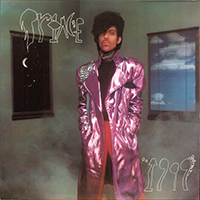Album: 1999: Difference between revisions
No edit summary |
No edit summary |
||
| (6 intermediate revisions by 2 users not shown) | |||
| Line 18: | Line 18: | ||
|introduction = [[Album: 1999|1999]] is the fifth full-length studio album by [[Prince]]. It was released worldwide in October 1982 (twelve months after his previous album, [[Album: Controversy|Controversy]]). Albeit the name [[The Revolution]] appears in mirror-writing on the sleeve, it was never officially attributed to [[Prince and the Revolution]].) | |introduction = [[Album: 1999|1999]] is the fifth full-length studio album by [[Prince]]. It was released worldwide in October 1982 (twelve months after his previous album, [[Album: Controversy|Controversy]]). Albeit the name [[The Revolution]] appears in mirror-writing on the sleeve, it was never officially attributed to [[Prince and the Revolution]].) | ||
In March 1983 the album received a re-release as a 7-track single LP in all territories but the US, omitting [[D.M.S.R.]], [[Automatic]], [[All The Critics Love U In New York]] and [[International Lover]]. At the same the a cassette issue of the album was issued with nine tracks, adding [[D.M.S.R.]] and the | In March 1983 the album received a re-release as a 7-track single LP in all territories but the US, omitting [[D.M.S.R.]], [[Automatic]], [[All The Critics Love U In New York]] and [[International Lover]]. At the same the a cassette issue of the album was issued with nine tracks, adding [[D.M.S.R.]] and the B-side [[How Come U Don’t Call Me Anymore]]. Both were issued in a picture-sleeve with a photo of [[Prince]] rather than the hand drawn '1999' graphic. | ||
The initial CD-release of the album had 10 tracks, omitting [[D.M.S.R.]], as the time limit on CDs was 74 minutes when they were first introduced. When CD capacities increased, however, the track was re-added to the tracklist with later re-issues. | The initial CD-release of the album had 10 tracks, omitting [[D.M.S.R.]], as the time limit on CDs was 74 minutes when they were first introduced. When CD capacities increased, however, the track was re-added to the tracklist with later re-issues. | ||
| Line 186: | Line 186: | ||
|see also = | |see also = | ||
{{SeeAlso| | {{SeeAlso| | ||
|item1 = [[Album: 1999 Deluxe|1999 ''Super Deluxe Edition'']] | |item1 = [[Album: 1999 Deluxe|1999 ''Super Deluxe Edition'']]<br>(2019 re-issue) | ||
|image1 = [[File:1999_Deluxe.jpg| | |image1 = [[File:1999_Deluxe.jpg|60px|border|link= Album: 1999 Deluxe]] | ||
|item2 = [[1999 Tour]] | |item2 = [[1999 Tour]] | ||
|image2 = [[File:1982_1999_access_all_areas.jpeg|x100px|link= 1999 Tour]] | |image2 = [[File:1982_1999_access_all_areas.jpeg|x100px|link= 1999 Tour]] | ||
| Line 233: | Line 233: | ||
{{ChartLine| | {{ChartLine| | ||
| Date = 8 Sep. 1984 | | Date = 8 Sep. 1984 | ||
| Chart (Country) = ''' | | Chart (Country) = '''UK''': [[UK Albums Chart]] | ||
| Peak Position = 30 | | Peak Position = 30 | ||
| Weeks in chart = 21 | | Weeks in chart = 21 | ||
| Line 311: | Line 311: | ||
|alternative = | |alternative = | ||
|trivia = At time [[Album: 1999|1999]] went platinum, it was the third double-pocket album released in the 80’s decade to top the million sales mark. It followed Bruce Springsteen’s ''The River'' and Dan Fogelberg’s ''The Innocent Age''. In their article '''Prince Scores Platinum Double''' (Vol.95 N°24 - 11 June 1983), Billboard commented that such achievement was noteworthy for a black artist because the last black starts to accomplish similar success with a double studio album were Donna Summer with ''Bad Girls'' in 1979 and Stevie Wonder with ''Songs In the Key of Life'' in 1976. Billboard also added that in the past 5 years (1979 to 1983), only two double-pocket studio albums went platinum: Fleetwood Mac’s ''Tusk'' and Pink Floyd’s ''The Wall'' (both in 1979). | |trivia = At time [[Album: 1999|1999]] went platinum, it was the third double-pocket album released in the 80’s decade to top the million sales mark. It followed Bruce Springsteen’s ''The River'' and Dan Fogelberg’s ''The Innocent Age''. In their article '''Prince Scores Platinum Double''' (Vol.95 N°24 - 11 June 1983), Billboard commented that such achievement was noteworthy for a black artist because the last black starts to accomplish similar success with a double studio album were Donna Summer with ''Bad Girls'' in 1979 and Stevie Wonder with ''Songs In the Key of Life'' in 1976. Billboard also added that in the past 5 years (1979 to 1983), only two double-pocket studio albums went platinum: Fleetwood Mac’s ''Tusk'' and Pink Floyd’s ''The Wall'' (both in 1979). | ||
|references =[[Book:_The_Vault| | |references =''[[Book:_The_Vault|The Vault: The Definitive Guide to the Musical World of Prince (2004)]]'' | ||
* <b>Copyright:</b> [http://cocatalog.loc.gov/cgi-bin/Pwebrecon.cgi?DB=local&PAGE=First US Copyright Office / SR0000041035 / 1982-11-17] | * <b>Copyright:</b> [http://cocatalog.loc.gov/cgi-bin/Pwebrecon.cgi?DB=local&PAGE=First US Copyright Office / SR0000041035 / 1982-11-17] | ||
* <b>Certifications:</b><br> | * <b>Certifications:</b><br> | ||
Revision as of 15:28, 9 May 2025
| All Prince Albums | All Related Artists Albums | ► 1984: Purple Rain |
| 1999 |
|
|
| ||||||||||||||||||||||||||||||||||||||||||||||||||||||||||||||||||||||||||||||||||||||||||||||||||||||||||||||||||||||||||||||||||||||||||||||||||||||||||||||||||||||||||||||||||||
|
Additional Information
| ||||||||||||||||||||||||

|
1981 Controversy |
All Albums | All Related Artists Albums | 1984 Purple Rain |

|










